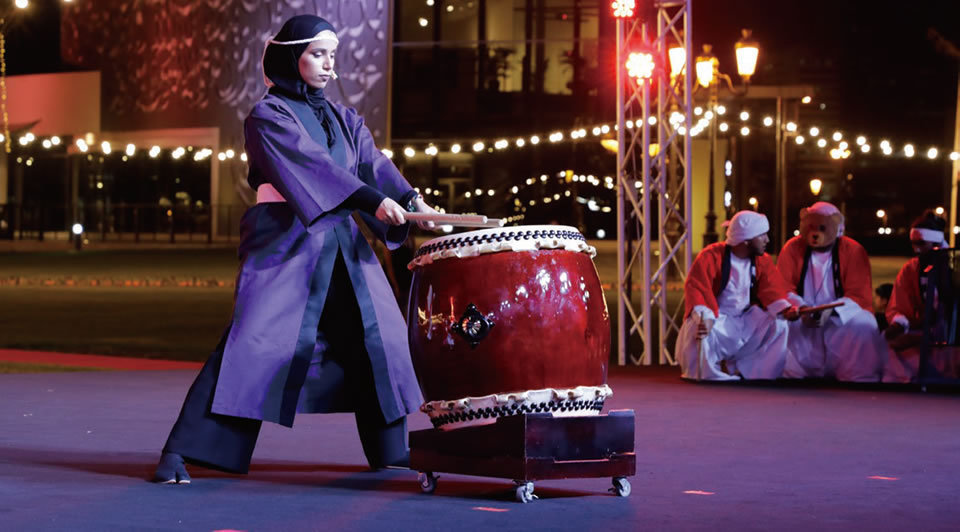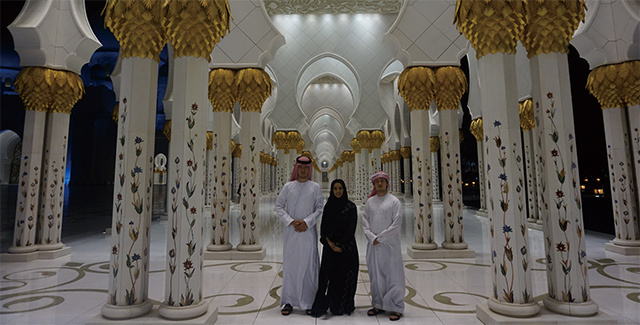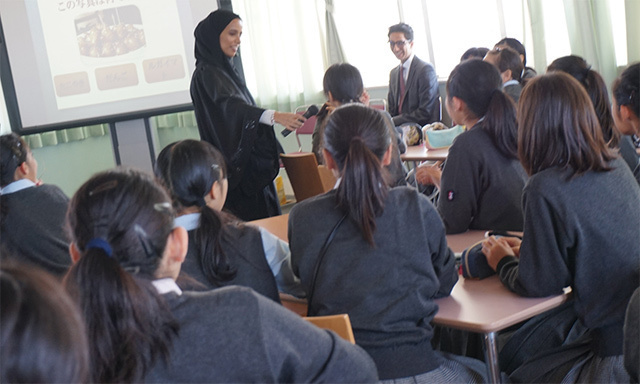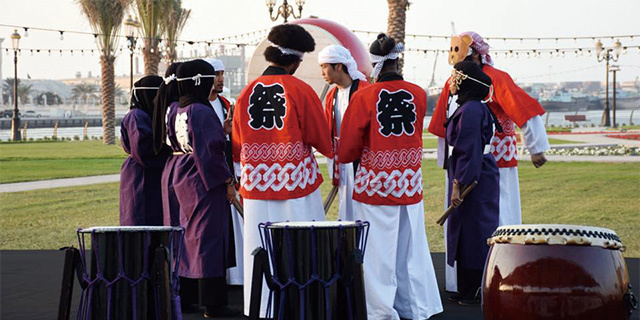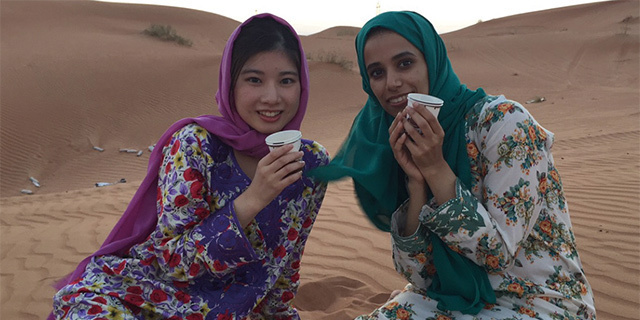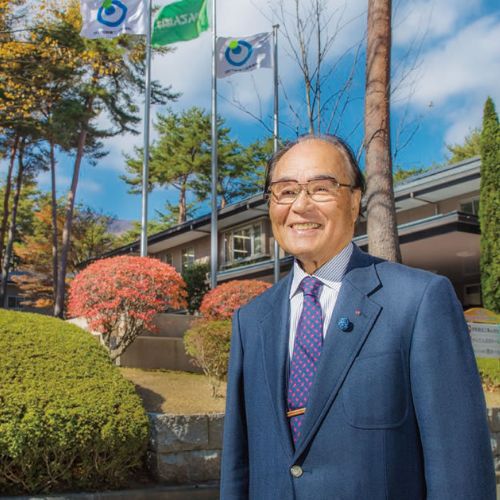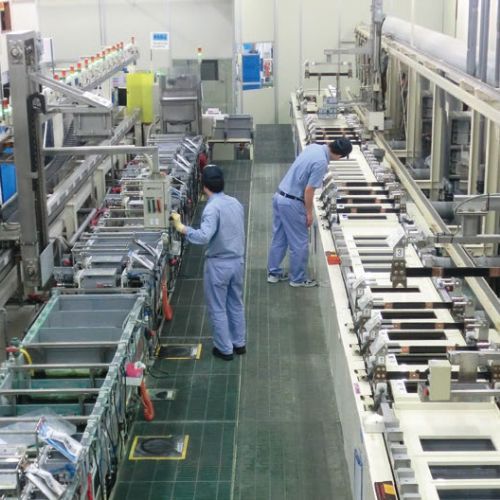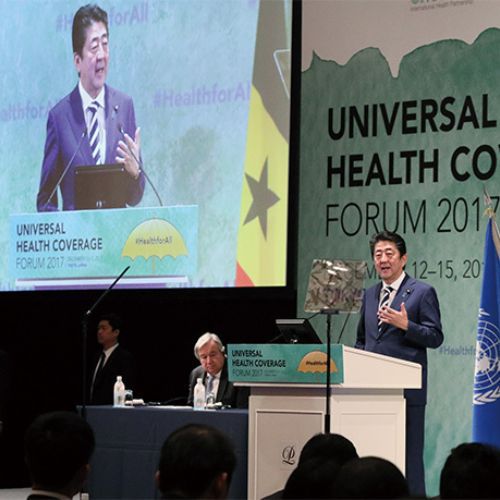Amna Al Darmaki of the United Arab Emirates (UAE) never imagined becoming a Japanese wadaiko drummer, although she had been promoting culture exchange between Emirati and Japanese people since she made her first Japanese friend in 2011. But meeting Yotaro Matsutani and his Japanese traditional wadaiko drum group “Kharsha” (meaning “exciting” in Arabic) in 2017 added bold new dimensions to her intercultural activities.
Amna is from the inland city of Al Ain, meaning “The Spring,” and she deeply appreciates the history, tradition, and natural beauty of her hometown. Al Ain has been continually inhabited for over 4,000 years, and its oases once provided respite for caravans. Visitors can now stroll through Al Ain Oasis, lush with 147,000 date palm trees. The oasis, together with historical remains of settlements and ancient burial sites in Al Ain became a World Heritage site in 2011. Al Ain also has an old fort and many museums; the city seeks to preserve the past even as it builds state-of-the-art shopping malls and business centers.
Amna enjoyed Japanese anime and video games as a child, and then switched to Japanese dramas (she still watches the anime Chibi Maruko-chan). But when she cofounded Sakura Club in 2012 during her senior year at UAE University and started searching for information about Japan for the club magazine, she “fell in love with traditional Japanese culture.” After graduating, she made her first visit to Japan, and then began working at her university, keeping her ties to Sakura Club.
In 2016, Amna made her second trip to Japan, this time on a mission. Fujimigaoka High School in Tokyo had pulled back from sending students to the UAE for homestays due to parents’ concern for their children’s safety. Amna took it upon herself to correct this misunderstanding. With family and friends in the UAE, she made a video showing the safety of public transportation, the welcome given in homes, and the modern, attractive city life. At Fujimigaoka High School, Amna met with students and their parents and showed them the video. Also, a Fujimigaoka graduate who had visited the UAE told how the Emirati blend of the old and new had inspired and changed her. She shared pictures of beautiful desert landscapes where one can barbecue by drifting sand dunes, gaze into quiet, starry skies, and make wishes watching shooting stars. Amna’s personal touch and the graduate’s good report succeeded in opening the door for students to again visit the UAE.
In April 2017, mutual friends introduced Amna to Matsutani. She watched Kharsha perform, her first experience of wadaiko’s dynamic sounds, rhythm, and motion. Matsutani told Amna his story. Although he had grown up and spent half his life in the UAE, he “had not interacted with the Emirati people and had no idea about their lifestyle.” Matsutani joined the wadaiko club at his high school in Japan, and in 2015 went professional with the popular wadaiko group Sai (Japanese for “color” or “vividness”). He returned to the UAE in 2016 as an international student at Zayed University and founded Kharsha in January 2017 with UAE friend Taryam Al Katheeri “to be a platform where Japanese and Emiratis could come together.” Amna resonated with Kharsha’s vision of contributing to the community in fields such as education, cultural exchange, and medical rehabilitation, and shared their concern that wadaiko performances alone could not realize these goals. She joined the group to expand Kharsha to include other cultural activities, and also to try wadaiko herself.
Other friends joined, and the wadaiko group grew to nine members: two UAE women including Amna, three UAE men, one UAE-Japanese man, two Japanese women, and Matsutani, their leader. They worked hard—Matsutani’s practice schedule included an intensive wadaiko camp—and their efforts paid off. Audiences cheered their performance on UAE Flag Day in November, surprised to see “the first Emirati women ever to play the drums.” Kharsha’s men wore Japanese hakama pants and Emirati tops and the women wore Japanese happi coats and Emirati scarves in a visual appeal for cultural exchange. Kharsha then performed on the popular Al Arabiya broadcasting channel in December 2017, climaxing their eventful first year.
Matsutani says that he cannot speak of Kharsha without thanking Amna and Taryam. Along with planning and participating in the wadaiko performances, these teammates have worked to expand Kharsha’s cultural activities. Kharsha is now reaching out to the wider Japanese and Emirati communities with meetings to practice Japanese and Arabic calligraphy, for example, or to share culinary specialties. During Ramadan, Amna invited Japanese friends to fast together, breaking the fast at sundown with a shared meal.
Wadaiko drumbeats have sounded out in the UAE, calling Japanese and Emiratis together for significant cultural exchange and exciting kharsha friendship.

























